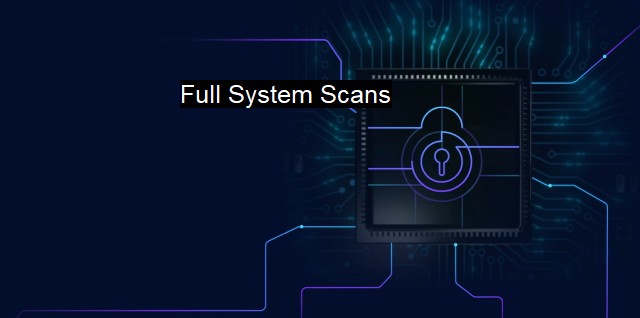What are Full System Scans?
Ensuring Computer Safety through a Comprehensive Full System Scan: A Proactive Measure against Cybercriminal Threats
Full system scans, as the name suggests, refers to a comprehensive assessment that involves a detailed and thorough scan of an entire computer system. Predominantly utilized full system scans are implemented to identify and exterminate any vicious threats that may compromise the security and optimal functioning of a computer system. A full system scan aims to secure every connection between the software, the hardware, and the user data.The concept behind full system scans is drawn from a proactive approach to safety in cyberspace. To eliminate the risks and downtime affiliated with a cybersecurity breach, full system scans ensure that no stone is left unturned. This process includes the minute inspection of every file on the user’s hard drive, every installed program, every existing system file. intrusive components commonly known as malware such as rootkits, viruses, worms, Trojan horses, spyware, among other cyber threats, are examined, isolated, and exterminated.
Before expounding on the critical need and benefits of a full system scan, it is crucial to understand what these tangible cyber threats are. Malware is a collective term for a series of intrusive and hostile elements intended to hinder the usual operations of a computer system, often for nefarious conducts like stealing sensitive user information. Malware infecting a system can result in sluggishness of the system, unexpected and erratic behavior of applications, and excessive networking traffic.
A full system scan is equipped to capably handle such threats. Executing a full system scan tends to be a part of the protective features an antivirus grants. An antivirus software program is crafted to detect, counteract, and obliterate all possible dangers lurking in the online world. These programs sit continuously vigilant on a computer system operating redundantly in the background, ensuring each threat is swiftly detected and aggressively eliminated.
A full system scan ensures top-tier security for your computer system and across different networks. Conducting these scans regularly reduces the risk of unwittingly downloading spyware or any malicious bugs that could compromise your personal data's security. As much as real-time protection from an antivirus helps in safeguarding against threats, a full system scan offers precise and thorough security that aids in early detection and removal of lurking system loopholes.
a full system scan comes in handy for incidents where a potentially unwanted application (PUA) is resident on your system. These applications might not be categorically termed as malicious, but they often pave the way for major cybersecurity threats. Full system scans review such applications, and following the user's consent, suppress or eradicate them from the system.
There are immense benefits of a full system scan for both individuals and organizations. These include the firm establishment of a well-secured system leading to uninterrupted productivity and financial gain. Both small and large organizations face the risk of violating compliance regulations if their respective technology-based systems are infected, leading to issues such as data breach lawsuits leading to costly repercussions. Full system scans, therefore, play an imperatively critical role in preemptively tightening system securities, saving businesses from both tangible and intangible losses.
In sum, a full system scan is a fundamental piece in the line of defense against a range of malicious threats posed by evolving cyber-environment. By offering a panoptic review of your system’s condition, regularly running a full system scan is the surefire way to stay a step ahead of cyber threats while ensuring the seamless functioning of your computer system. Nonetheless, what remains important even after conducting a full system scan, users need to maintain online vigilance and exercise safe surfing practices, complementing the mutual goal shared with the antivirus program – securing the computer system from potential threats.

Full System Scans FAQs
What is a full system scan?
A full system scan is a comprehensive scan of all the files and folders on your computer or device, including the operating system and applications, to detect any potential threats or malware.When should I perform a full system scan?
It is recommended to perform a full system scan at least once a week or whenever you suspect that your device might be infected with malware. It is also advisable to perform a full system scan after installing new software or updates.How long does a full system scan take?
The time it takes to complete a full system scan varies depending on the size of your hard drive and the speed of your processor. Generally, it can take anywhere from a few hours to several hours to complete a full system scan.Are there any precautions I should take before performing a full system scan?
Yes, it is advisable to close any open programs or files and disconnect from the internet before performing a full system scan. This will minimize the chances of the scan being interrupted or slowed down by other processes. It is also recommended to ensure that your antivirus software is up to date before performing a full system scan.| | A | | | B | | | C | | | D | | | E | | | F | | | G | | | H | | | I | | | J | | | K | | | L | | | M | |
| | N | | | O | | | P | | | Q | | | R | | | S | | | T | | | U | | | V | | | W | | | X | | | Y | | | Z | |
| | 1 | | | 2 | | | 3 | | | 4 | | | 7 | | | 8 | | |||||||